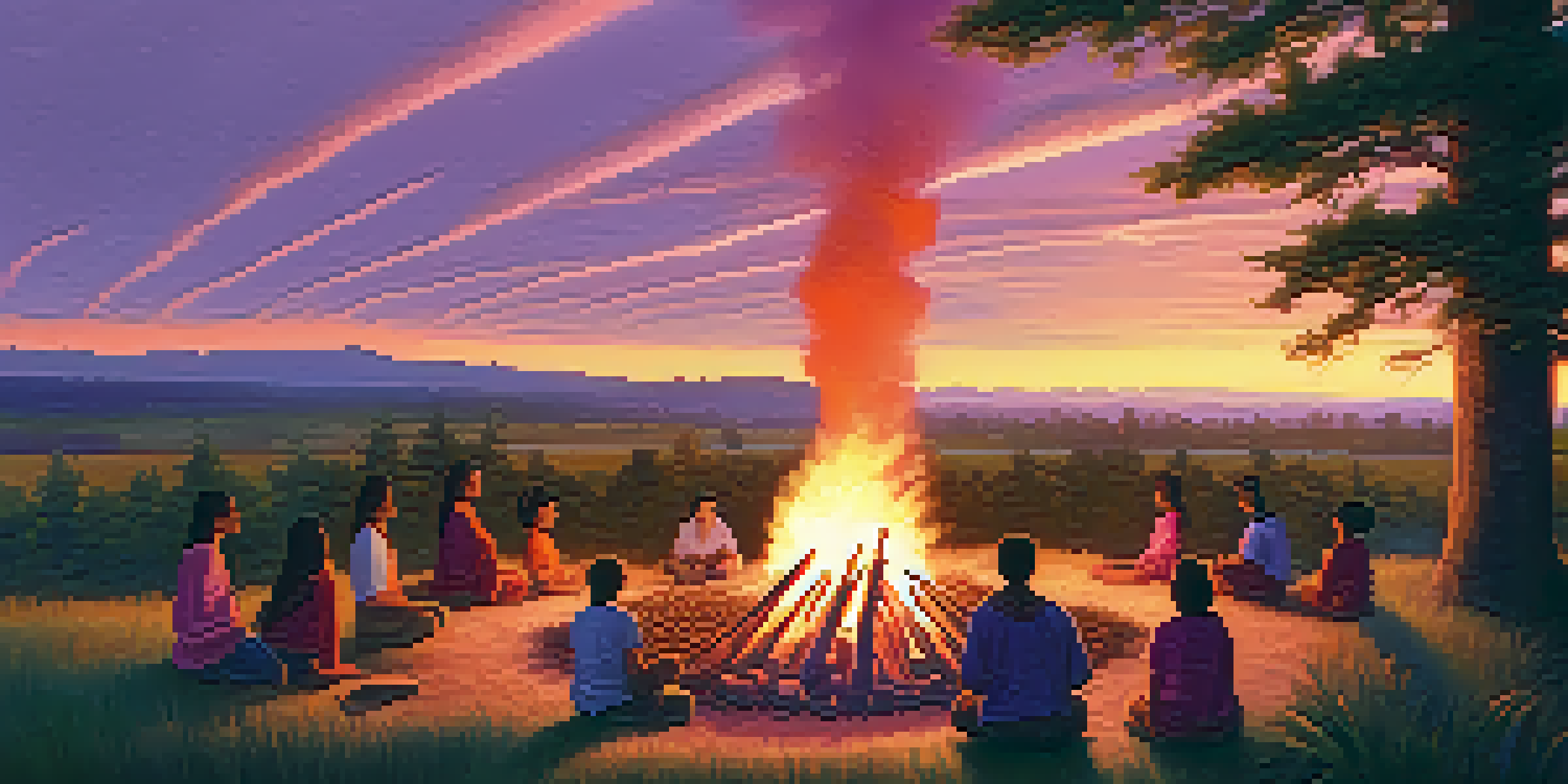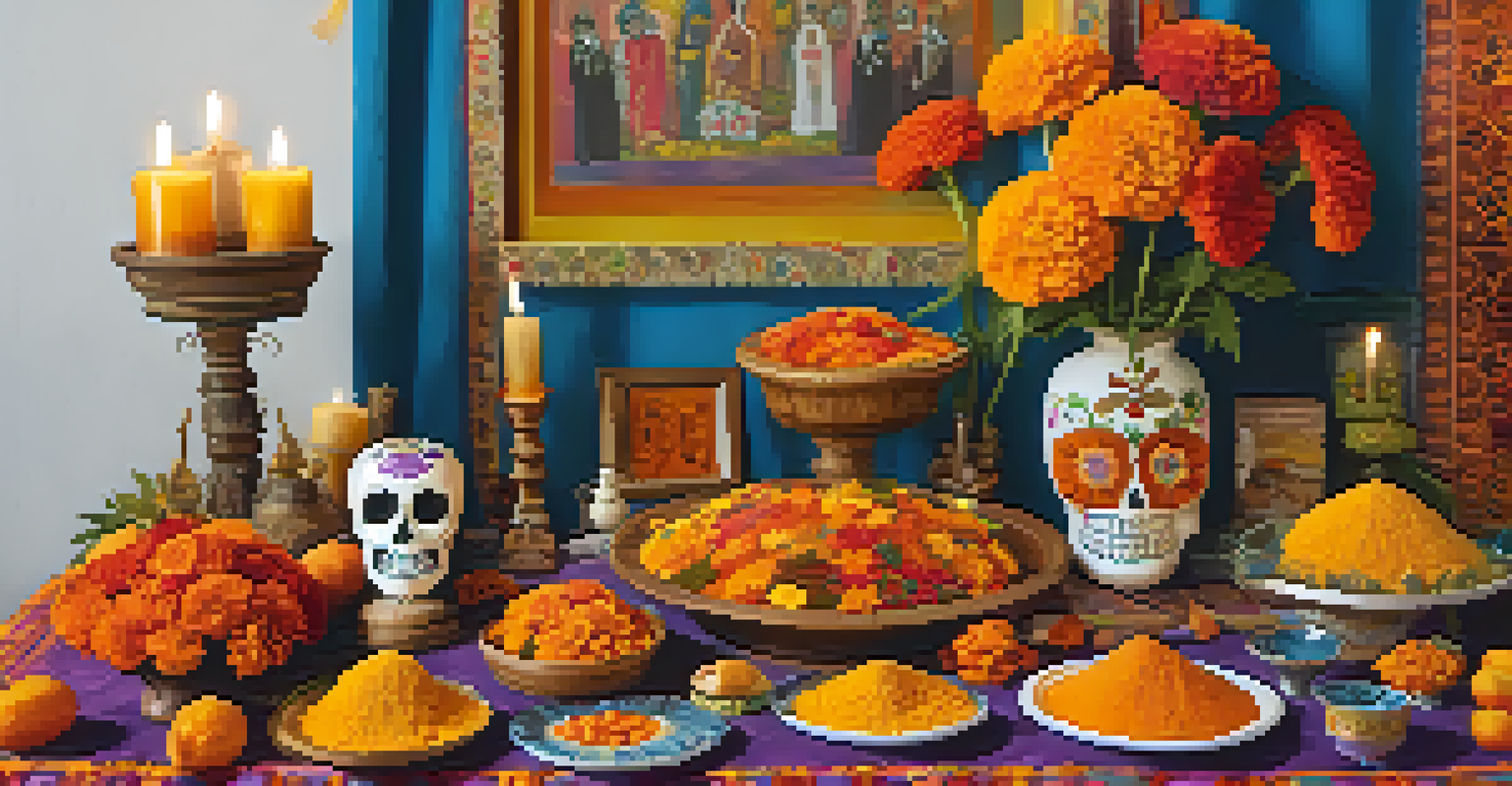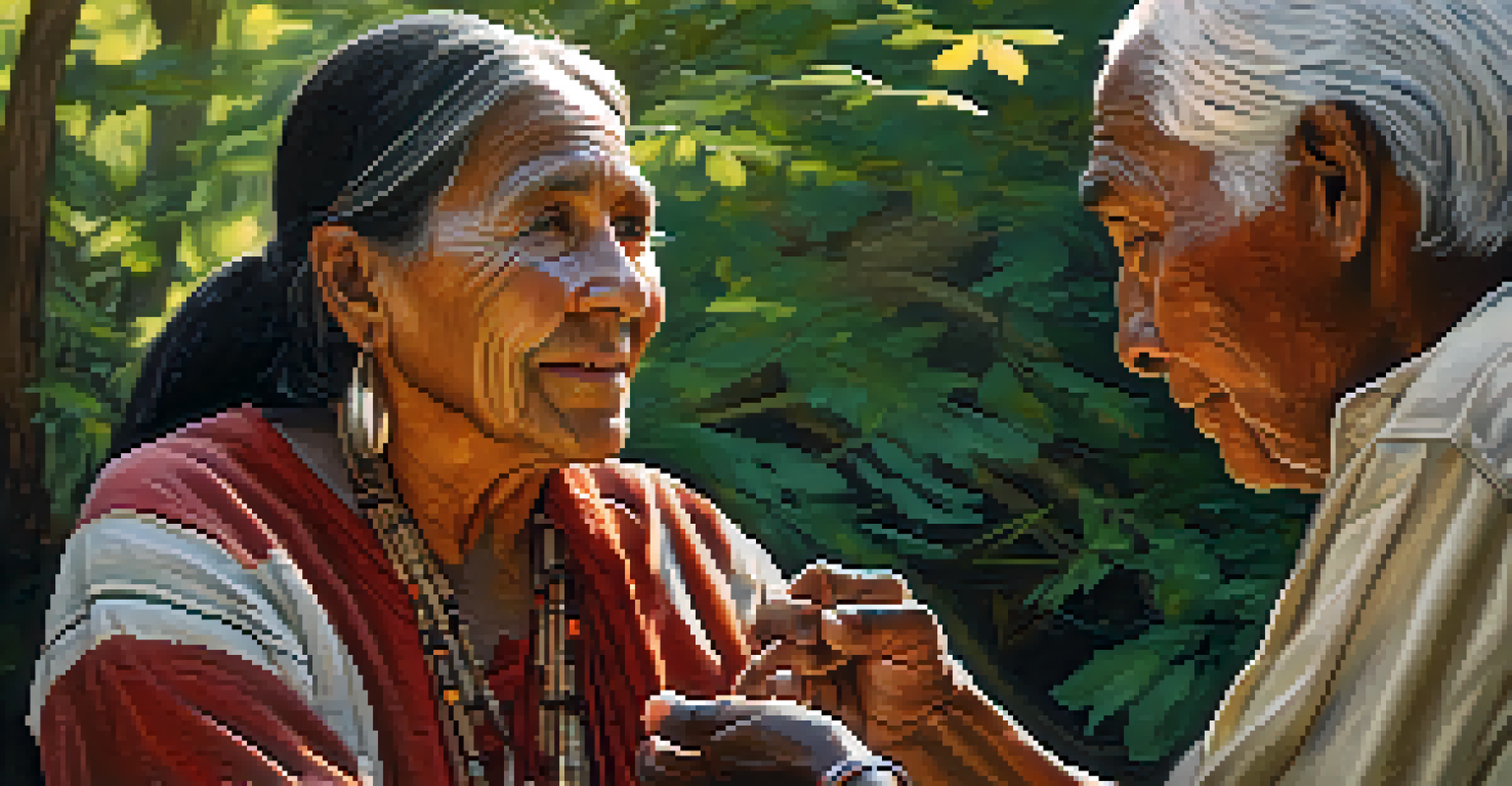The Role of Ancestors in Indigenous Spiritual Practices Today

Understanding the Connection to Ancestors in Indigenous Cultures
In many Indigenous cultures, ancestors hold a sacred place, serving as guides and protectors. This connection is rooted in the belief that the spirits of the deceased continue to influence the living. For example, many tribes honor their ancestors through rituals, recognizing their contributions and wisdom.
We do not inherit the earth from our ancestors; we borrow it from our children.
This connection is not just historical; it is an ongoing relationship where ancestors are seen as active participants in the community's life. Elders often share stories that emphasize the importance of these ties, reminding younger generations of their heritage. By understanding their ancestors' lives, individuals can navigate their own identities and roles within the community.
Moreover, this ancestral connection fosters a sense of belonging and continuity. As individuals engage with their ancestral roots, they cultivate a deeper understanding of their place in the world, reinforcing cultural values that have been passed down through generations.
Rituals and Practices Celebrating Ancestral Spirits
Rituals play a crucial role in maintaining the bond with ancestors in Indigenous cultures. Ceremonies might include offerings, prayers, or communal gatherings that honor those who have passed. For instance, in some tribes, the Day of the Dead is celebrated with elaborate altars that feature pictures and favorite foods of the deceased.

These practices serve a dual purpose: they not only honor the ancestors but also reinforce communal ties among the living. By participating in these rituals, individuals strengthen their identity and connection to their culture. It’s a vivid reminder that ancestors continue to shape the community’s values and beliefs.
Ancestral Connection is Vital
In Indigenous cultures, the bond with ancestors serves as a guiding force, helping individuals navigate their identities and cultural values.
Additionally, these rituals provide an opportunity for reflection and healing. They allow individuals to process grief while celebrating the legacies of their loved ones, creating a space for both sorrow and joy. This cyclical nature of life and death is a fundamental aspect of many Indigenous spiritual practices.
Ancestral Wisdom in Contemporary Decision-Making
Ancestral wisdom often guides decision-making in Indigenous communities today. Many individuals turn to the teachings of their forebears when faced with challenges, whether personal or communal. This reliance on ancestral knowledge emphasizes the value of experience and the importance of historical context.
The greatest gift is not being afraid to question.
For example, Indigenous leaders may consult with elders about environmental stewardship, drawing on traditional ecological knowledge that has been passed down through generations. This approach not only respects the past but also informs sustainable practices that benefit the community and the land.
By integrating ancestral wisdom into contemporary life, Indigenous peoples create a bridge between the past and the present. It fosters resilience and adaptability, empowering communities to thrive while remaining grounded in their heritage.
The Role of Ancestors in Healing Practices
Healing practices among Indigenous peoples often invoke ancestral spirits for guidance and support. Many believe that the spiritual presence of ancestors can aid in physical and emotional healing. For instance, traditional ceremonies might include chanting or drumming, which are thought to invite ancestral energies into the healing space.
This spiritual aspect of healing emphasizes a holistic approach, where mental, emotional, and physical well-being are interconnected. By honoring ancestors in these practices, individuals find strength and solace, creating a supportive environment for healing. The presence of ancestors is felt as a comforting reminder that they are not alone in their struggles.
Rituals Reinforce Community Ties
Rituals honoring ancestors not only pay tribute to the deceased but also strengthen communal bonds and provide a space for reflection and healing.
Furthermore, these practices can help individuals confront and heal from historical traumas. By acknowledging the collective pain of their ancestors, communities can work towards healing not just for themselves, but for future generations as well.
Modern Challenges to Ancestral Connections
Despite the strong ties to ancestors, modern challenges can disrupt these connections. Urbanization, globalization, and cultural assimilation often lead to a disconnection from traditional practices. Many Indigenous individuals may find it difficult to maintain their cultural identity in a rapidly changing world.
The loss of language and traditional knowledge can further exacerbate this disconnection. Without the ability to communicate ancestral teachings, younger generations may struggle to understand their heritage fully. This gap can lead to feelings of isolation and a diminished sense of belonging.
However, many communities are actively working to reclaim and revitalize their ancestral connections. Through cultural workshops, language classes, and community gatherings, they strive to bridge the gap between the old and the new, ensuring that the wisdom of their ancestors is not lost.
The Influence of Ancestors on Identity Formation
The influence of ancestors extends deeply into identity formation for Indigenous peoples. Many individuals draw strength and pride from their lineage, which shapes their self-perception and worldview. Recognizing the sacrifices and achievements of ancestors can empower individuals to embrace their cultural identity.
For instance, storytelling is a vital tool for passing down ancestral narratives that highlight values, struggles, and triumphs. These stories serve as a source of inspiration for younger generations, helping them navigate their own paths. By understanding where they come from, individuals can cultivate a stronger sense of self.
Ancestral Wisdom Guides Modern Life
Indigenous peoples often rely on ancestral teachings to inform contemporary decision-making and sustainable practices, bridging the gap between past and present.
Moreover, this connection to ancestry fosters community cohesion. When individuals feel proud of their heritage, they are more likely to engage in cultural preservation efforts and communal activities. This sense of belonging strengthens the overall identity of the community, creating a vibrant tapestry of shared history and purpose.
Looking Ahead: The Future of Ancestral Connections
As Indigenous communities continue to navigate the complexities of modern life, the role of ancestors remains vital. There is a growing recognition of the importance of preserving ancestral knowledge and practices. Many are finding innovative ways to integrate traditional teachings with contemporary life, ensuring their relevance for future generations.
For example, digital platforms are being utilized to share stories, language, and cultural practices. This approach not only reaches a wider audience but also engages younger members of the community, allowing them to connect with their heritage in meaningful ways. Technology becomes a tool for bridging the gap between past and present.

Ultimately, the future of ancestral connections lies in the hands of the next generation. By embracing their heritage and actively participating in cultural practices, Indigenous youths can ensure that the wisdom of their ancestors continues to thrive. This ongoing relationship fosters resilience and hope, as communities look to the future while honoring their past.